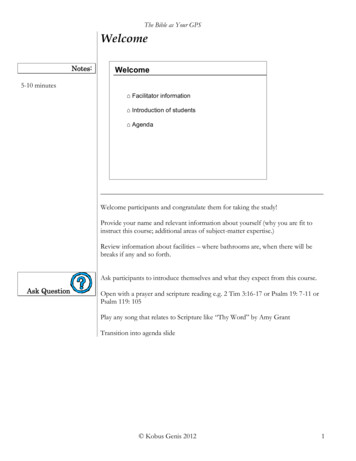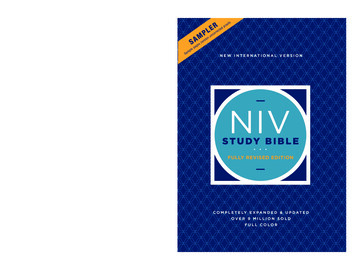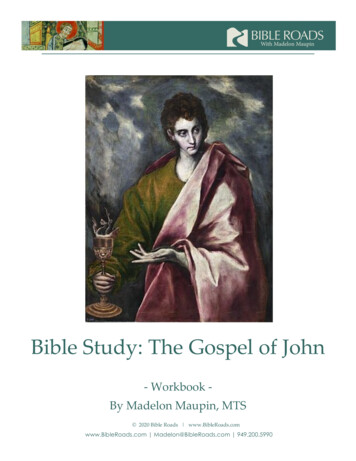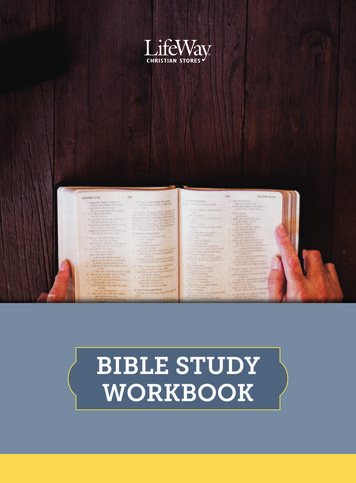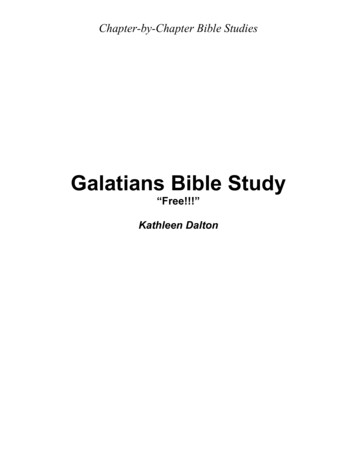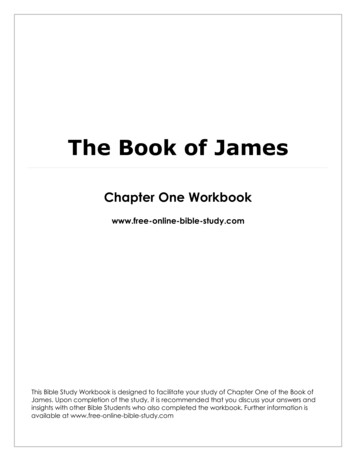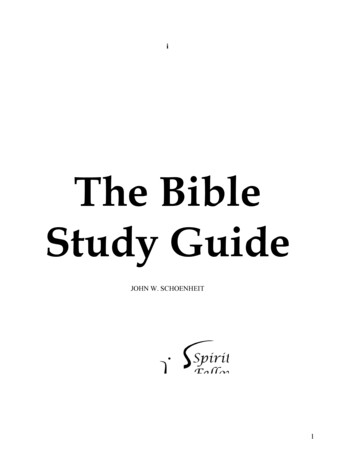
Transcription
iThe BibleStudy GuideJOHN W. SCHOENHEIT1
Note: Most Scriptures quoted in this book are from The New International Version (NIV). References taken from other translations orversions are noted as such, e.g., King James Version (KJV), American Standard Version (ASV), New American Standard Bible (NASB), etc. In verses or quotations from other authors, words in bold print indicate our own emphasis and words inside [brackets]from Scripture or from other authors are ours.Scripture quotations marked (NIV) are taken from the HOLY BIBLE, NEW INTERNATIONAL VERSION . NIV . Copyright 1973, 1978, 1984 by International Bible Society. Used by permission of Zondervan. All rights reserved.Scripture quotations marked (KJV) are taken from The King James Version of the English Bible, 1611.Scripture quotations marked (NASB) are taken from the New American Standard Bible , 1960, 1962, 1963, 1968, 1971, 1972,1973, 1975, 1977, 1995 by The Lockman Foundation Used by permission.Scripture quotations marked (RSV) are taken from the Revised Standard Version of the Bible, copyright 1952 [2nd edition, 1971] bythe Division of Christian Education of the National Council of the Churches of Christ in the United States of America. All rightsreserved.Scripture quotations marked (NRSV) are taken from the New Revised Standard Version Bible, copyright 1989, Division of ChristianEducation of the National Council of the Churches of Christ in the United States of America. Used by permission. All rights reserved.Scripture quotations marked (The Message) are taken from The Message by Eugene H. Peterson, copyright 1993, 1994, 1995, 1996,2000, 2001, 2002. Used by permission of NavPress Publishing Group. All rights reserved.Scripture quotations marked (RHM) are taken from the Emphasized Bible by Joseph Bryant Rotherham. Kregal Publications, GrandRapids, MI, reprinted 1994.Scripture quotations marked (AMP) are taken from the Amplified Bible, Copyright 1954, 1958, 1962, 1964, 1965, 1987 by TheLockman Foundation. Used by permission.Scripture quotations marked (ASV) are taken from The American Standard Version, 1960.Scripture quotations marked (YLT) are taken from Young’s Literal Translation, by Robert Young, 1898.Scripture quotations marked (ESV) are taken from The Holy Bible, English Standard Version Copyright 2001 by CrosswayBibles, a division of Good News Publishers. All rights reserved.Scripture quotations marked (TLB) are taken from The Living Bible, Copyright 1971. Used by permission of Tyndale HousePublishers, Inc., Wheaton, IL 60189. All rights reserved.Scripture quotations marked (BBE) are taken from The English Bible in Basic English 1949/1964, ASCII version Copyright 19881997 by the Online Bible Foundation and Woodside Fellowship of Ontario, Canada. Licensed from the Institute for CreationResearch. Used by permission. Printed in 1965 by Cambridge Press in England.The sacred name of God, Yahweh, is indicated by “LORD.”First Edition 2007All rights reserved. No part of this book may be reproduced, stored in a retrieval system, or transmitted in any form or by any means,electronic, mechanical, photocopying, recording or otherwise, without the prior written permission of the publisher, except in the caseof brief quotations embodied in critical articles and reviews, academic papers, and other non-commercial uses. For more informationcontact us at the address below.Printed in the United States of America.To receive our bimonthly magazine, The Sower, and a complete listing of our materials contact us at:Christian Educational ServicesA division of Spirit & Truth Fellowship International 2144 East 52nd StreetIndianapolis, IN 46205888.255.6189 (317.255.6189), M-F 8:30 to 5 (EST)Fax: 317.255.6249STF@STFonline.orgwww.STFonline.orgFor further study please visit our research website: www.TruthOrTradition.comDedicated to helping you understand the Word of God, free from the traditions of men.2
TABLE OF CONTENTSIntroduction to the Principles and Keys of Bible Study . 5Principles of Biblical Interpretation .13Keys to Properly Understanding the Scriptures . 25Errors in Transmission . 27Errors in Translation . .33Errors in our Understanding . 49The Administrations In Scripture Chart 85ADDITIONAL STUDY HELPSBooks of the Bible . 87Abbreviations of the Books of the Bible .89Greek and Hebrew Alphabet. .91A Guide to Basic Bible Study Tools .93Hebrew Verbs .95The Genitive Case . 97Connectives: Little Words With Big Jobs . 101Grammar .105Greek and English Verbs . 107Fundamentals of English Grammar .109Words and Their Uses .117Paradigm of Personal Pronouns .119Figures of Speech in the Bible (alphabetical list) .129Alphabetical Listing of Figures of Speech by English Names .147Greek and Latin Roots .151Bibliography .1633
4
INTRODUCTION TO THE PRINCIPLESAND KEYS OF BIBLE STUDYWHY DO WE STUDY THE BIBLE?It is important to have the proper perspective about the Bible, and understand why westudy it. In these modern times, individualism is highly esteemed, and it has becomefashionable for people to read the Bible and ask, “What does this mean to me?” Whilethat question is important, there is one much more important: “What is God saying?”To answer the first question, “What does this mean to me” does not require any studyof the Bible, for any passage of Scripture can mean any number of things to the personreading it. After all, it is simply his opinion. He could be either right or wrong about whatthe verse is actually saying, but of course it will mean something to him.God did not author the Bible to be merely a tool for personal reflection and devotion,something we ponder over and are satisfied with what it means to us. No, God gave usHis Word for many reason, including, to foster the personal relationship between Himselfand us; so we could obey Him and thus have the best possible lives here on earth; so wecould know how to build and maintain godly marriages, families, and societies; and sowe could know the way of salvation and be assured of everlasting life. We can have thesethings in part or in whole if we know what God says in His Word and follow Hiscommands. No one, including God, likes to be misunderstood. When we write a letter tosomeone, we want him to know what we meant, not just what he thought we meant. TheBible is God’s letter to mankind, and it is important we discover and understand what Hemeans.Each of us will stand before the Lord Jesus on Judgment Day and be rewarded orchastised based on whether or not we believed, and lived by, the directions andcommands God has given to us. The Apostle Paul made it very clear that just because weare not aware of any sins we have, that does not justify us.1 Corinthians 4:4 (NKJ)For I know nothing against myself, yet I am not justified by this; but He whojudges me is the Lord.Parents and children often go through the tension between what one “meant” and theother “thought he meant.” A typical parent-teenager interaction occurs when a motherwrites her teenage children a note (or perhaps now sends a text message on a cell phone)that they misinterpret. They probably miss her point for a couple reasons: they did notreally pay attention to what she said, and they wanted to do something else anyway. Thenthe mother is angry, and unsatisfied with the “reasons” her children give as to why theyignored her wishes. Her feeling is that her message was clear enough, and had they reallywanted to know what she said, it would have been clear to them.5
That is similar to how it will be on Judgment Day. God has given mankind writteninstructions by which He wants us to live. He is our Creator and Provider, and it is notunreasonable for Him to ask people to learn what He knows will benefit our lives if weobey His instructions. The heart of Bible study, then, is to find out what God says andwhat He means so we can follow His directions. If we do, we will be blessed both in thislife and in the age to come. Jesus made it clear that those who love him obey what hesays, while those who do not love him will not pay attention and obey.John 14:21Whoever has my commands and obeys them, he is the one who loves me.John 14:24He who does not love me will not obey my teaching.Finding out what God says and means requires study. Many Christians agree that theWord of God is “the Truth,” yet from one Bible come many differing interpretations ofwhat “the Truth” is. It was never God’s intention that people read the same text and comeaway with different ideas about what it is saying. In Matthew 22:29, Jesus said to theSadducees, “You are in error because you do not know the Scriptures or the power ofGod.” He did not say, “You Sadducees have your opinion, and I have mine, and bothopinions are okay with God.” His reference to error implies that there is both a correctand an errant understanding of each verse of Scripture. Consider the following verse:2 Timothy 2:15Do your best to present yourself to God as one approved, a workman who doesnot need to be ashamed and who correctly handles the word of truth.“Correctly handles” is translated from the Greek compound verb, orthotomeo, whichis built from the Greek root-words, ortho (straight) and temno (to cut). The idea is thatthere is a “straight cutting,” correct handling (NIV), or right dividing (KJV), of the Wordof God. There is a way to rightly divide God’s Word so that we get out of it what Heintends, and not just our opinion. Also, just is there is a way to rightly divide the Word ofGod and handle it accurately, there is a way to incorrectly handle the Word andmisunderstand or misinterpret it.Also, that 2 Timothy 2:15 says, “do your best,” and “workman,” imply that we needto be diligent and work hard to get to the truth of the Word. This requires focus,precision, and discipline. Our responsibility as God’s children is to correctly handle theWord. Anything less than that does not properly respect and honor the God who createdand fathered us.It is God’s desire that Christians be likeminded about His Word.1 Corinthians 1:106
I appeal to you, brothers, in the name of our Lord Jesus Christ, that all of youagree with one another so that there may be no divisions among you and that youmay be perfectly united in mind and thought.Christians will never be likeminded about the Bible if we are unwilling to examinewhat we believe and why we believe it. Our best chance at a unity of the faith is toprayerfully read and study the Scriptures using proven study techniques and resources,allowing God to show us the truths in it, and being willing to change what we believe ifwe see it does not fit with Scripture and logic.WHERE SHOULD WE BEGIN TO READ THE BIBLE?The Bible is a large book, and it may take years of reading it for a person to feel hehas a grasp on it. The student of the Bible should not be defeated by this, but rather makesure that he regularly takes time to read it. A large amount of the Bible is easy to read andunderstand, and anyone who reads it faithfully will know a lot in a short amount of time.Furthermore, if the Bible is read in the same way as any other large book, perhaps anhour a day a few days a week, which is a lot less than the TV most people watch, itshould only take a few months at most to get all the way through it. By the time a personhas read the Bible several times, many things that were confusing at first will be mucheasier to understand. Most people do not dedicate much time to reading it, however, andmany become discouraged by things they do not understand. Reading a good Study Biblecan make reading easier, because some of the questions that beginning readers alwaysseem to have are answered right in the notes on the page, and any accompanying mapsand illustrations make it much easier to keep up with the biblical record.There are many strategies that one can take to read and understand the Bible. Onesuccessful strategy is to read the New Testament first, starting with one or more of theFour Gospels, then reading sequentially through Acts and the books referred to as the“Church Epistles” (Romans through Thessalonians). After that, read the rest of the NewTestament. Another strategy is to read a Gospel such as Matthew and read the parallelrecords in the other Gospels at the same time (the references directing us to parallelsections are in good study Bibles), then read the Gospel of John, then read Acts, then theChurch Epistles. It is a good idea when reading the Bible to keep a piece of paper handy,and write questions down that can be answered at a later time.1When it comes to reading the Old Testament, new readers often get stuck in the moredifficult sections, so they never get to the easier and fun parts and really enjoy it. Beginreading the Old Testament knowing that each time you read it you will gain greaterunderstanding. It is also good for the beginner to read the parts that are actual historical1This brings up an important point about Bibles: they are expensive and need to be well cared for.Furthermore, as we place more and more notes in them, their value increases. A proven way to extend thelife of a Bible is by having a good Bible cover. A good cover not only protects the Bible, it allows us tokeep our notes with our Bible without putting them between the pages of the Bible itself. It is very harmfulto the binding of a Bible to wedge papers, notebooks, pens, or anything else between the pages.7
accounts. Genealogies, laws, and lists slow the reader down and break the story line.They will be necessary later, but are not helpful to the beginner. A proven way to startunderstanding the Bible is by reading Genesis; Exodus 1-20, 24, 32-34 and 40; Numbers11-25 and 32; Deuteronomy 32:44-52 and 34; Joshua 1-12, 13:1 and 22-24; Judges, Ruth,1 and 2 Samuel, 1 and 2 Kings, 1 Chronicles 10 and following (but skip the lists ofnames), 2 Chronicles, Ezra, Nehemiah, and Esther.Read the Old Testament this way a few times and you will begin to get a basichistorical understanding of it. It is also helpful to read records in Samuel and Kings alongwith their parallel records in Chronicles to get the best understanding of both books.Many Bibles have cross references that make it easy to know where to read in Chroniclesif you are reading Samuel or Kings, or vice versa.After getting a basic understanding of the historical flow of the Old Testament, it isimportant to become familiar with the Mosaic Law in Exodus-Deuteronomy. This willboth help you better grasp the historical sections of the Old Testament and reveal muchof the heart of God concerning how to treat people, the seriousness of sin, and muchmore. Do not get in a hurry to learn the prophetic books of Isaiah, Jeremiah, Ezekiel, etc.Each one speaks in a historical context, regarding the times in which they lived andbrought messages from God concerning the people’s obedience or disobedience to Hislaws. Therefore, it is essential to learn the history from Kings and Chronicles as well asthe law, in order to best understand the prophets. Once a basic grasp of the history ofIsrael and the Mosaic Law is gained, then reading the prophets will be much easier.There is no “easy way” to gain a scope of the Bible. It must be read, and read, andreread. The sad fact is that most Christians ignore the Bible. Many Christian men whothink nothing of watching a three-hour football game (or two) on a Sunday have not spenta single three-hour session reading the Bible even once during the year. Thecommandment of God to love God and love our neighbors is very clear, and eachChristian can rest assured that simply reading the Bible with a little extra understandingprovided by good teachers and good study helps will go a long way toward living a godlyand spiritually powerful life. Each Christian should set aside time to read the Bibleregularly, and occasionally set aside larger blocks of time to read for more context andscope. Our priorities as God’s children must include reading His Book.WHAT ARE SOME OF THE THINGS WE SHOULD STUDY TOUNDERSTAND THE BIBLE?There is depth and richness in the Bible that will keep any student occupied andexcited for a lifetime. Students of the Bible should have a growing knowledge of English,because the vocabulary of Scripture is rich and powerful. The greater appreciation onehas of the language he is reading, including its figures of speech, the easier it is to seenuances in the text. Furthermore, the biblical accounts did not happen in a vacuum, but ina cultural context. Therefore, studying the cultures and customs of the biblical times,especially Israelite, Greek, and Roman, adds much depth of understanding to reading the8
Bible. Thankfully, there are many good books available today on the history, culture, andcustoms of the peoples in the Bible.Studying the history of nations such as Egypt, Syria, Assyria, Babylonia, Persia,Greece, and Rome, all of which had an influence on Israel and the people of God, alsoadds understanding of the Bible. Likewise, studying the geography of the Bible landshelps us understand the Bible records. The lands of the Bible are tremendously varied,and just as life is different for someone living in the great plains of Iowa than forsomeone living in the Rocky Mountains, life was different for the people in differentareas. Knowing the geography helps us understand the biblical records as well as identifywith the people of the Bible.Studying the ancient languages themselves, Hebrew, Aramaic, and Greek, can openour understanding in many ways. Even having a little knowledge about the originallanguages can be a tremendous help. Also, knowing something about the history anddevelopment of the Bible from its earliest manuscripts until today will give any student agreater appreciation and understanding of the translations we have today. There is a lot tostudy, and each Christian must decide how much time he wants to spend and how deephe wants to go with the tools that are available.STUDY MEANS STUDYThere is a reason people can read the Bible for years and never see its great truths:they never really study it. There is a huge difference between just reading and actualstudy. Successful college students, and to a lesser extent High School student, have tolearn to study books to the end that they learn the material and remember what theylearned. The Bible is, among other things, a book of history, so lets use the example of acollege student studying a history book.The diligent history student will carefully read his textbook and usually underlineimportant passages or use highlighters to emphasize the main points. He will rereadpassages that are unclear, and work to understand what the author is saying. He willprobably make notes, either in the book or in a separate notebook, or both, and payattention to dates, numbers, people’s travel, relationships (such as who is married towhom, who are friends or enemies), births, deaths, and other important information. If hedoes not understand a word he will use a dictionary, and if he needs to know more abouta person or place he will use an encyclopedia. He will think about whether or not what heis reading makes sense, and if it does not, will try to figure out why, eventually arriving atan understanding of the material. He will review his notes and strive to remember whathe has read. He may even make flash cards to help him remember important people,dates, or events.Very few Christians read the Bible that way, but we should. The Bible is not a shrine,but a tool for godliness, so we Christians should feel free to make notes, highlight or9
underline verses, and make any annotation that will help us in our efforts to be likeChrist. In fact, now that many versions of the Bible are available on computers, it is easyto print out a book of the Bible and write all over it in order to gain greater understandingwithout being afraid of ruining an expensive Bible. For example, someone interested inthe development of the early Church might print out a copy of Acts, then highlight thepeople with one color, the places with another, the healings with a third, the sermons witha fourth, the confrontations with a fifth, and so on, while at the same time trackingpeople’s movements in a Bible Atlas. Someone who studies the Bible with that kind ofdetail will learn it a lot faster than someone who just sits in an easy chair and reads it,often forgetting what he just read.A helpful suggestion is to make notes in our Bibles with pencil, because they can bechanged later, and do not bleed through the paper like some ink does. Some people havea second Bible, a “study Bible,” that they mark up as they study, and keep their firstBible more note free for meditative reading. Also, we should not just read passively, butask questions as we read.We are not in a position to obey God if we do not know and understand what He says.Furthermore, we must remember that what to us upon first reading may just seem like thehistory of the Jews or simple events in the life of Jesus or Paul, is in fact God’scommunication to us, and buried in the records are the great truths that God wants us toknow so we understand both Him, and life itself. We do not get points with God forreading the Bible if we do not understand it, or remember what we read. The Christianlife is not like the game of horseshoes, where “close” is good enough. We need to knowwhat God says and then live by it.PRINCIPLES AND KEYS TO BIBLE STUDYOne of the major reasons why people have different ideas concerning what the Biblesays is because they use different rules or standards for interpreting it. We believe that thefollowing principles and keys are essential to understand and apply if Christians are toarrive at a correct understanding of the Bible. We have divided these into two majorcategories:1. Principles of biblical interpretation2. Keys to biblical interpretationThe “principles” are the basic assumptions upon which we base our study of theBible. We freely admit that people have challenged and disagreed with these principlesthrough the years. Obviously, for example, if a person does not believe in God, then theidea that the original text of the Bible was authored by God is preposterous. As for us ofSpirit & Truth Fellowship International, we believe that God exists, and that He hascommunicates with man via the document we refer to as the Bible. We believe there arepre-suppositional truths upon which genuine and profitable study of the Bible must bebuilt, and we have attempted to set them forth in this study guide.10
In contrast to the “principles” mentioned above, the “keys” to biblical interpretationare the rules and guidelines we must follow to come to a correct interpretation andunderstanding of Scripture. Keys “unlock” what is unknown so that it can be known andunderstood. It is these keys that clarify how and from where apparent contradictions enterinto the Scriptures. Every serious student must keep in mind the principles and the keysas he studies in order to arrive at a proper understanding of the Bible.11
12
PRINCIPLES OF BIBLICAL INTERPRETATION1. The original text of the Scriptures was given by God, and it represented the veryheart and character of God.The original text of the Bible was given by God. This is clearly stated in 2 Timothy3:16, which states, “All Scripture is God-breathed.” God gave the contents of the Bibleby revelation to those who faithfully and accurately recorded what He spoke. Thoughthere were more than 40 “writers” (people who wrote what God spoke to them), the Wordof God has but one “Author,” God, as He clearly states in Scripture.2 Peter 1:20 and 21(20) Above all, you must understand that no prophecy of Scripture came about bythe prophet’s own interpretation.(21) For prophecy never had its origin in the will of man, but men spoke fromGod as they were carried along by the Holy Spirit.The Bible is God’s communication to man, and He gave it so we could know Himand live righteously before Him. The Bible reveals the love God has for mankind, Hispatience with people, and His forgiveness. It reveals His mercy and grace, and atantalizing glimpse of the wonderful things He has in store for those who choose to obeyHim and thus receive everlasting life.2. The original God-Breathed Word was perfect and true. It was without error orcontradiction.The God-breathed Word was perfect and true when He originally gave it (Ps.119:160, Ps. 19:7-11, etc.). God is truth, and “does not lie” (Titus 1:2), so there can be nocontradictions in His original Word. This simple truth is the bottom line of biblicalinterpretation. If we believe the Bible does not reveal truth, or that it containscontradictions, which would make knowing the truth unattainable, why study it at all?We must approach Scripture with the firm belief that it is true, and that no interpretationof a verse can be right if it contradicts the clear teaching of other verses.The fact that the original God-breathed Word was perfect, true, and withoutcontradiction does not mean it was easy to understand or without apparentcontradictions. God authored the Word in a way that requires the utmost from mankind,which is what He deserves. To understand and obey the Word requires much from us,both intellectually and morally.3. The Bible was written for believers, not for skeptics.The Bible was not written for skeptics, but for those who want to learn about, andobey, God. The existence of God is a “given” in the Bible. For example, the book ofGenesis opens: “In the beginning God created .” It does not start with different proofs13
for the existence of God, but assumes it. The Bible openly asserts, “The fool says in hisheart, ‘There is no God’” (Ps. 14:1; 53:1).The loving God who authored the Bible is not impressed with study for study’s sake,as if somehow we humans could amass enough knowledge to impress Him. God gave usthe Scripture so we could know Him and walk in righteousness, obedience, and love.Those people who are merely curious or study only for self-centered purposes, or whocome to the Bible looking for contradictions and errors, will not see the great truths thatthe Word of God has within it.Many of the deep truths of the Word cannot be understood by “natural” people, butonly by people who are “spiritual,” meaning they have the spirit of God (1 Cor. 2:14, 15).These spiritual men and women have believed some of the basic truths of the Scripture,accepted Jesus as Lord (Rom. 10:9), and become born again of God’s spirit. The Biblecontains the will of God, but His will is not always obvious and sometimes must besearched for diligently. Of course there are some parts of Scripture that arestraightforward and very easy to understand. However, there are other parts that arewritten in such a way that they confound those who do not have ears willing to hear orare unwilling to be diligent in their study (Prov. 2:1-5, 25:2; Matt. 13:10-13; 1 Cor. 2:14).To arrive at the truth, one must have faith in God and trust in the integrity of His Word.For the God who created the entire universe out of nothing, acts like multiplyingfood, stopping the sun, and raising the dead, are easy. Notions of the natural mind thatsuch things are “unlikely,” “improbable,” “hard to believe,” or “impossible” are neverreason to reject the biblical record. Prayer and trust in God (faith) are necessary forproperly understanding the Bible and seeing its awesome precision and harmony.Action is often a prerequisite for understanding. Sometimes in order to understand asubject we must first obey the Word and act on what we already know. We must have adesire both to know and to act on the knowledge we find in Scripture. Part of “seeking”may involve acting obediently on what we already know. For example, if we are studyingprayer, we will not get to the point that we really understand it until we act on what wealready know and start to pray. Jesus said action was essential to understanding.John 7:17If anyone chooses to do God’s will, he will find out whether my teaching comesfrom God or whether I speak on my own.Christ said that if we really want to know if something comes from God, we need tochoose to “do,” that is, to act. When we humble ourselves and obey God, we willunderstand things that we were never able to fully understand until we obeyed. Similarly,if we are living in sin and disobedience, there will be aspects of Scripture that will beclosed to us. Scripture assures us that “God opposes the proud but gives grace to thehumble” (James 4:6). If we are proud, and will not act on what we clearly read in theBible, God will oppose us, and the Word will not open to our understanding, but whenwe are humble, and act on what we know, God opens the eyes of our understanding (Eph.1:18).14
Christ said plainly, “seek and you will find” (Luke 11:9). The word “seek” is in theimperative mood, present tense, and as such our translation of the phrase could perhapsbe expanded to say, “seek diligently and keep on seeking!” Those who want to trulyunderstand the Bible must seek diligently and then act on what they are learning.4. God has a purpose for everything He says in His Word, and therefore everythingin God’s Word is important.“All Scripture is God-breathed and is useful ” (2 Tim. 3:16). The Bible student mustapproach Scripture with the premise that it is “useful,” and that God has a purpose forwhat is said, who says it, where it is said, when it is said, how it is said, and to whom itis said. According to John 21:25, “Jesu
The Bible Study Guide JOHN W. SCHOENHEIT. 2 Note: Most Scriptures quoted in this book are from The New International Version (NIV). References taken from other translations or . Scripture quotations marked (KJV) ar



